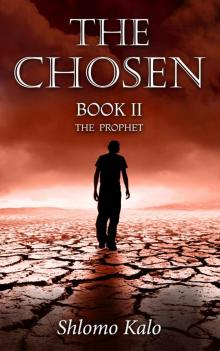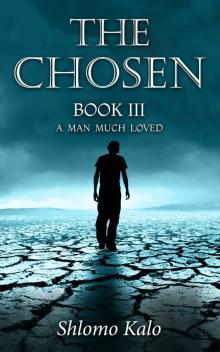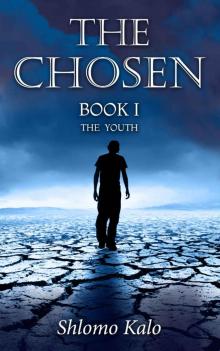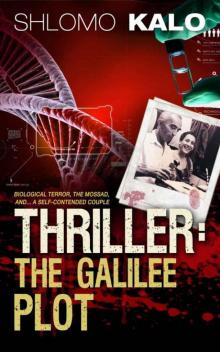- Home
- Shlomo Kalo
THE CHOSEN : The Prophet: Historical Fiction (The Chosen Trilogy Book 2) Page 2
THE CHOSEN : The Prophet: Historical Fiction (The Chosen Trilogy Book 2) Read online
Page 2
And the messenger-runner broke down in tears when he tried to describe the moving scenes to Nashdernach, sitting at his table, and all the clerks of the office listening to his disordered words; even those who were supposed to be recording them were utterly distracted from their task by the strength of the feelings that had gripped them.
Even the oily little eyes of the chief counsellor to the King of Babylon filled with tears that he was powerless to resist, and they glided over his round ruddy-red cheeks, and were absorbed into his bushy beard, flecked with silvery threads.
Finally, in a voice still defying his attempts to control it, the minister asked the messenger to leave the room, and not to return until he had composed himself; only then should he make another effort to dictate a succinct report for the benefit of the scribes.
When the minister’s instructions had been followed, he rose to his feet and, snapping his fingers pleasurably behind his back, he approached him, leaned towards him and said:
“It seems, after all, He is worthy of our trust!”
In Mishael’s Lodging
A year passed. And it came about one day that all of them, he and his companions, happened to be in one of the royal assembly rooms. The King’s senior advisers were about to convene a meeting in this room, and their Jewish clerks had come to prepare the tables. Adoniah was there too, although he often left Babylon to travel to strange and distant lands where he traded in all the commerce of the world, from shoe-laces to slaves and concubines for the royal palace. Through all these dealings, he had made a handsome profit for himself.
One after another they entered the room, unable to restrain their joy at the unexpected reunion.
“Hananiah!” cried Mishael, almost embracing his friend.
“Mishael!” cried Azariah, and hurried towards him. The three of them exchanged handshakes and jovial slaps on the shoulder – and at that precise moment, although through separate doors – he and Adoniah made their entrance.
Adoniah hurried towards him and shook his hand vigorously, with surprising sincerity, then turned to the others and repeated the exercise, with warm handshakes, and even a slap on the shoulder for Azariah.
“How I’ve missed you, my friends and brothers!” he exclaimed – “And how good it is that God has brought us all together. My feet have trodden the wide open spaces of the world, places I never imagined I would go to, places I never knew existed! All those nations and tongues and peoples and principalities, living and subsisting on this continent of ours that is so full of surprises…. and most of all – I have missed you!” He turned to him again, this time with a convivial slap to the shoulder. “For some reason,” he went on to say, his speech light and fluent – “It seems to me I haven’t behaved towards you the way I should, and this has pinched my guts and weighed heavy on my heart! Anyway, blessed is the hour of our meeting, and this opportunity that I have to confess to you the sin I committed against you!”
“You’re talking a great deal of nonsense!” he retorted. “I don’t reckon you have ever sinned against me in anything!”
“Oh, I’ve sinned, you need have no doubt of that!” Adoniah insisted, the cheerful look on his face still bright, and growing brighter from moment to moment.
“And I tell you this too, my friend and brother!” Adoniah cried, shaking his hand again, a clownish grin flexing his fleshy lips: “I’m going to sin against you some more!”
The other three advanced, as Adoniah went on to say:
“You were good-looking even as a boy and now you’ve gone from strength to strength, what a brilliant career! Who would believe it? A courageous young fellow, a high-ranking courtier and a man of God as well! The frivolous young girls who chase me around would be scared off by you, living angel of God that you are, pure and unsullied, noble and brave, never to be tripped up by the sins of the flesh, and invincible – seeing that God Himself, in person, defends you and stands by your side, keeping you secure against evil or adversity! And why does God the all-powerful do this?” cried Adoniah, turning to Mishael, Azariah and Hananiah and answering his own question: “Because there is no one more worthy of it than him – no one! And who could possibly be jealous of such a man, doing everything in his power to dig a pit before his feet, to set a trap into which he will fall? This surely belongs to the dark side, the side that leads astray and causes delusions, the side of hypocrisy and seething anger, the serpent from the Garden of Eden, in other words, the side – to which I am totally committed!”
Hananiah intervened, his voice, in normal times so evenly modulated, turning harsh and almost menacing:
“All you’re doing is fooling yourself! This power that you speak of can do nothing when it is revealed, in the open. It depends on cunning and deceit, and dark corners!”
“And perhaps,” Adoniah interrupted him, “I really am cunning beyond belief and sufficiently degraded, a genius in that regard, to deceive you all and in particular, to arouse the superior compassion of Belteshazzar, and to blunt his eternal vigilance. Ha-Ha-Ha-Ha!” He shook his head with its mass of rust-coloured hair and beard and added: “I’m warning you – don’t trust me!” Suddenly he turned more serious and wiped from his eyes the tears brought on by his wild laughter. “Don’t trust anyone and take good care of yourselves, especially you!” – he pointed at him and laughed again.
He did not respond, but maintained his composure. Adoniah went on to say:
“You make me so angry, the anger of flesh and blood! Always the chief player, always in control of yourself, always standing in the right place, following the right road, always standing tall, to put it plainly – always a prig!” He turned to the remainder of his audience and asked gaily: “Don’t you agree?”
“No!” the three companions replied with one voice, and as if they meant to protect him with their bodies, moved in closer and stood as a barrier between him and Adoniah.
“You seem to be drunk!” Azariah hissed between his teeth.
“Drunk, but not on wine!” Adoniah declared.
“What then, if not wine?” asked Hananiah and almost regretted his question, but the answer was not slow in coming.
When Adoniah spoke, his voice had changed and was calm and measured, although the arrogance of his mood was undiminished:
“On hatred!”
And suddenly, in an unexpected movement, Adoniah skirted the barrier of the three friends and stood facing him, fixed flashing eyes on him and asked:
“And you?”
“What?” he retorted in a clear, authoritative voice, not budging from his place.
“How much do you hate me?”
“I don’t hate you.”
“Pity me?”
“No.”
“Afraid of me?”
“No.”
“Despise me?”
“No.”
“And you make no distinction between me,” he hesitated for a moment, then completed his sentence – “and these, shall we say?” He pointed to the three friends, with a sweeping gesture of the hand.
“I do make a distinction.”
“Them you love and me – you hate!” cried Adoniah in a tone of triumph, like one who has caught his quarry or exposed another as a liar.
“I think of them with pleasure, and of you – with great sorrow!” he declared.
Adoniah stood with head bowed and made no reply.
Mishael exploited the pause to issue an invitation:
“Come to my room this evening. I have some wine from the homeland, which we can drink with a clear conscience!”
In Mishael’s lodging a surprise awaited them: besides the kosher wine, Gershon was sitting there – grey-haired now but looking fit in his clean clothing.
“You’re all growing beards!” he cried, clearly finding the reunion an emotional experience – “Only a little while ago your faces were so smooth!”
They looked into one another’s faces and perhaps for the first time realised they were no longer boys but men, young me
n with incipient beards.
“And have any of you taken wives yet?” Gershon asked curiously.
It emerged that Mishael, Azariah and Hananiah were soon to be betrothed to Jewish girls, precious finds indeed.
“There’s no place for bachelors in the Chaldean administration!” Azariah explained.
“It’s an immutable law,” added Mishael.
The three of them had searched, and found in the environs of the city of Babylon a devout and decent Jewish community. The fathers of this community had no objection to marrying off their eligible daughters, knowing that the prospective grooms were not only Jews but were also functionaries in the service of Nebuchadnezzar.
“And what about you, Adoniah?” Gershon asked.
“I intend to marry a beautiful Egyptian princess, whose father, the prince, was taken captive by Nebuchadnezzar. The price that I shall pay for her – is her father’s ransom!”
“And how can you afford the ransom? After all, a prisoner of such distinction will command a very high price!”
“The ransom will cost me nothing!” – Adoniah chuckled.
“How so?” Gershon persisted.
“The man who is holding him owes me a favour!” he declared, amused by the stony expressions of the others, and adding: “That’s how things work in the wonderful world of commerce – you repay good with good, and evil with evil! As it says in our Holy Law – an eye for an eye, a tooth for a tooth!”
“And what if she induces you to change your religion?” Gershon went on to ask.
“Either she’ll induce me, or I’ll induce her. We are neither of us renowned for our faith or for our zealous observance of commandments!”
“Egyptian women turned the head of King Solomon, the wisest of all men!” – Mishael commented earnestly.
“Then I shall gladly follow in his footsteps!” – Adoniah chuckled again and sat down at the table.
Gershon was given the seat of honour at the head of the table, and he blessed the bread and the fruit of the vine and one after another they all read from the scroll of the Psalms that Adoniah had succeeded in salvaging from the homeland. Then they sang their favourite anthems and finally, resumed their personal conversations.
He asked Gershon about his work in the office of the royal calligrapher, and he answered willingly, as all listened attentively, telling them how he had already been promoted on account of his experience and his expertise; all agreed he had no equal in the skilled use of the sharpened Egyptian stylus, and in determining the quality of parchment and in mixing the ingredients of ink in the correct proportions, producing the colour required to make the text leap from the page, so that the reader would not only read and understand and be informed, but would also derive enjoyment from seeing the script, as a work of art in its own right. In the same way, a person who is fond of natural beauty or of weapons of war will enjoy the sight of a field or a forest or, mutatis mutandis, a sharp sword or a dagger, a bow and arrow or assorted spears. As for Chaldean writing, it was not complicated at all; on the contrary it was simple and easy to copy – and very satisfying. It was of course a cuneiform script, Gershon went on to explain, clearly glad of the opportunity to demonstrate his intimate knowledge of the subject, unlike the complex Hebrew script. Nevertheless – Gershon concluded with a smile and a conspiratorial wink – he preferred the Hebrew alphabet with all its complications to the pale and uninteresting Chaldean equivalent.
“And why is that?” Hananiah wanted to know.
“Because of the spirit that the Hebrew letter embodies.”
“How so?” – Mishael expressed his sincere bemusement and added: “What makes you say that the letter embodies a spirit?”
And Azariah declared:
“The letter is dead and there is no spirit in it, never mind a living spirit!”
“You’re wrong there!” Gershon answered him – “the letter is alive, and every language has a living spirit of its own!”
“What is the spirit of the Chaldean language, and what does the Hebrew language tell you?” asked Azariah, utterly baffled.
“The spirit of the Chaldean language is a spirit of arrogance. It is sure of itself, and it has a solidity to it and yet – it lacks depth and profundity. The spirit of the Hebrew language on the other hand, aspires to the heights and is always trying, trying and trying again to reach the sky, the firmament which is the foundry of the language!”
“As the people, so is the language, and as the language so is the people!” – Hananiah tried to simplify the issue for himself, a faint spark of gratification in his voice.
Adoniah commented:
“If you carry on with this line of conversation, discussing the comparative merits of languages and peoples and nations and races, praising your own people and disparaging the Chaldeans, treating them with such open contempt – you’ll be accused of insulting the nation and its monarch and fomenting sedition – and before you know it you’ll be on your way to the copper mines in the bowels of the earth…”
“This is just a private conversation, between friends!” – Gershon retorted.
“Walls have ears!” – Adoniah put a finger to his lips as if warning of the dangers of idle talk and added: “He who guards his mouth and tongue, is guarded against adversity – so said the wisest of men!”
“In this room,” he interjected, “there are ears of flesh and blood only.” He meant to reassure Gershon, who responded:
“I spent long enough among the tanners on the Euphrates to learn what hardship means. No human being on earth could imagine what is going on there! No man sent down to the Euphrates to scrape animal skins for the Chaldean King will come out of there alive…”
“Except you, apparently!” Adoniah remarked with emphatic scorn.
“That was by the grace of God, the living God, the God full of mercy,” declared Gershon reverently, with an involuntary inclination of the head.
“Why don’t you tell us something about the Euphrates and the tanners?” Hananiah suggested.
Gershon looked at him again with a question in his eyes and, receiving his silent acquiescence, without hesitation and without a stumble, launched into his harrowing account:
“The river is broad at that point, so you can hardly see the other side, and it is shallow near the bank. The river bed is covered with stones and projecting rocks, creating all those swirling currents, and as if the currents weren’t enough to cope with, the tanners have to stand barefoot on these stones and rocky surfaces from before dawn until the first star rises in the evening. There they stand, without pausing for a moment, scraping the crude skins fresh from the beasts, and causing serious injury to their feet. To begin with, you feel intense pain. As time passes, the pain is numbed, but walking becomes a very complicated process. You can tell a tanner by the way he walks – slowly, ponderously, picking up his feet like a goose. Here’s the evidence!” – and with a quick movement, before anyone had the chance to protest, Gershon pulled off his shoes, unfastened the rags and revealed to the assembled company his bruised and battered feet, blackened toes deformed and folding under themselves, the very bones distorted. All looked on, and shuddered.
“What vicious beasts these Chaldeans are!” exclaimed Adoniah.
“How can you walk with your feet in that state?” asked Azariah.
“I manage, and every day I thank the living God for releasing me from that Hell, alive and with only this disability to cope with. God is full of grace and all powerful, doing great and marvellous things, going down into the depths to rescue those that He loves from the hands of the wicked, performing miracles and wonders. He is compassionate and kind and I shall bless Him and praise His name for as long as I live, and that’s all there is to say!”
Carefully he wrapped his feet again and put on his shoes.
“Is there more to tell?” asked Mishael.
“And why don’t the tanners leave that terrible place and seek employment elsewhere?” asked Hananiah.
“They have guards there, and overseers – guards with weapons at the ready, to prevent anyone leaving and overseers with whips – long, thick, black whips made from buffalo tails. A single blow from one of those could knock a healthy man to the ground. Somehow, my Lord rescued me from these floggings, but there are very few who can endure them. The overseers are fond of lashing the bare backs of the tanners, as we stand there naked as the day we were born in the dirty, frothing water, a wooden scraper in one hand and in the other – a vile-smelling animal skin.”
“Didn’t they supply you with clothing?” he asked.
“The new tanner is given a shirt, a loin cloth, a strip of coarse, untreated wool to wrap around the head, and a pair of shoes. But all this stuff disintegrates within a few days, leaving him without even a scrap of material to preserve his modesty. No other clothing is supplied. One issue is supposed to last you for life – not such a long time, admittedly.
“I never knew a tanner who endured this back-breaking toil for more than seven years. I was the oldest of them all, and no one expected me to last long. Within six months, a year at the most, they reckoned the overseer’s whip would knock me down – and I wouldn’t get up, not ever. They’re a heartless, merciless lot those overseers; wild, ravening creatures are paragons of compassion compared with them!
“There were times when the work was proceeding to the full satisfaction of the overseers and the guards, and not one of the tanners was doing anything to disrupt the routine, all working in silence without looking up or attempting to move paralysed limbs, from before dawn until evening, and then one of the overseers cracks his black whip over a tanner who has caught his eye, and this merely as a means of relieving boredom or as he himself would put it, for the sake of exercise. The overseer’s cronies come hurrying along to join in the fun, howling with raucous laughter, and the whips lash the body of the chosen victim until he collapses on the spot, falls in the water and usually doesn’t come up alive…”

 THE CHOSEN : The Prophet: Historical Fiction (The Chosen Trilogy Book 2)
THE CHOSEN : The Prophet: Historical Fiction (The Chosen Trilogy Book 2) THE CHOSEN: A Man Much Loved: Historical Fiction (The Chosen Trilogy Book 3)
THE CHOSEN: A Man Much Loved: Historical Fiction (The Chosen Trilogy Book 3) The Fantastical Adventures of Leutenlieb of the House of Munchausen
The Fantastical Adventures of Leutenlieb of the House of Munchausen THE CHOSEN : The Youth: Historical Fiction (The Chosen Trilogy Book 1)
THE CHOSEN : The Youth: Historical Fiction (The Chosen Trilogy Book 1) THRILLER: The Galilee Plot: (International Biological Terror, The Mossad, and... A Self-contended Couple)
THRILLER: The Galilee Plot: (International Biological Terror, The Mossad, and... A Self-contended Couple)